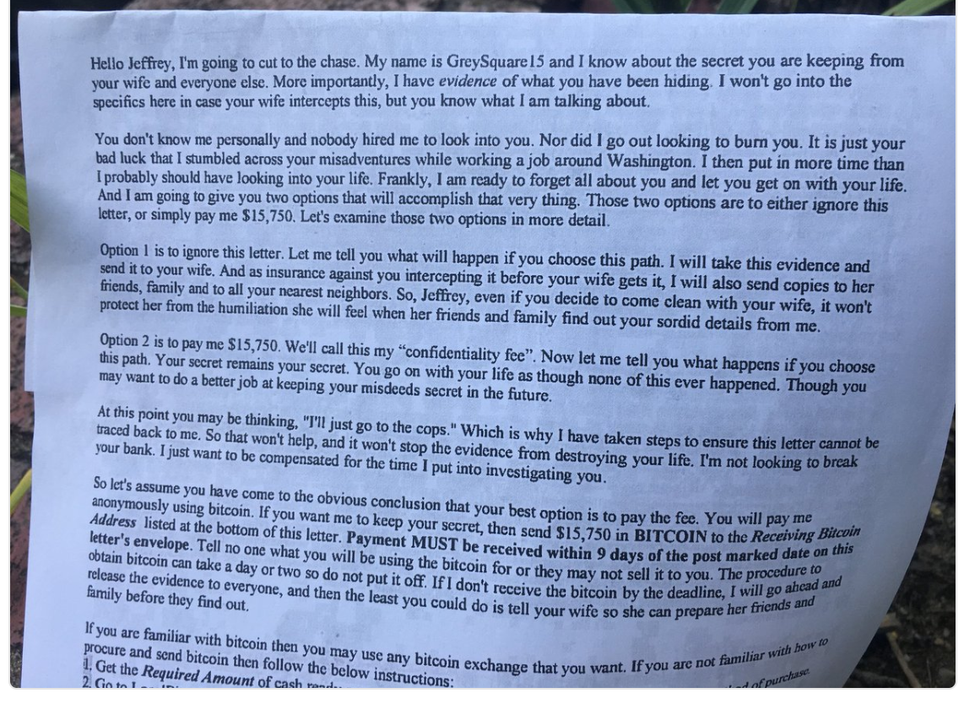Imagine receiving a letter in the mail which threatened to expose your infidelities unless you paid a huge sum of money to a hacker. Even if you'd done nothing wrong, being blackmailed wold be a fairly disquieting experience. It's the very same situation many in the Northern Virginia & DC areas are experiencing, according to the FBI's Internet Crime Complaint Center (IC3).
The IC3 issued a warning this week, saying:
The Internet Crime Complaint Center (IC3) has recently received an increase in reports about extortion attempts received via e-mail and postal mail and using specific user information to add authenticity. While there are many variations in these extortion attempts, they often share certain commonalties.

Here are some of the things many of these scams have in common:
The extortion attempt comes as an e-mail or letter from an unknown party.
The recipient's personal information is noted in the e-mail or letter to add a higher degree of intimidation to the scam. For example, a recipient's user name or password is provided at the beginning of the e-mail or letter.
The recipient is accused of visiting adult websites, cheating on a spouse, or being involved in other compromising situations.
The e-mail or letter includes a statement like, "I stumbled across your misadventures," or "I installed malware on the adult video site" as an explanation of how the information was supposedly gathered.
The e-mail or letter threatens to send a video or other compromising information to family, friends, coworkers, or social network contacts if the ransom is not paid.
The e-mail or letter provides a short window to pay, typically 48 hours.
The recipient is instructed to pay the ransom in Bitcoin, a virtual currency that provides a high degree of anonymity to the transactions.
Jeff Strohl from Washington D.C., received a scam letter in the mail, demanding he pay over $15k in Bitcoin or risk having his "infidelities" exposed. Having nothing to hide, he immediately showed it to his wife. It read:
My name is GreySquare15 and I know about the secret you are keeping from your wife and everyone else. More importantly, I have evidence of what you have been hiding. I won't go into the specifics here in case your wife intercepts this, but you know what I am talking about,
Though he was confident he'd done nothing wrong, reading the letter still made Strohl's "heart drop:"
If I don't receive the bitcoin by the deadline, I will go ahead and release the evidence to everyone, and the least you can do is tell your wife so she can prepare her friends and family before they find out
The FBI commented:
It is import to remember these extortion scams change to take advantage of current events such as high profile breaches or new trends involving the Internet to add authenticity,
Similar scams became common in 2015 after Ashley Madison, a social networking site for people who want to cheat on their spouses, was hacked. The scammers may or not be associated with the actual hackers.
The IC3 offered this advice for staying safe online:
Do not open e-mail or attachments from unknown individuals.
Monitor your bank account statements regularly, as well as your credit report at least once a year for any fraudulent activity.
Do not communicate with unsolicited email senders.
Do not store sensitive or embarrassing photos of yourself online or on your mobile devices.
Use strong passwords and do not use the same password for multiple websites.
Never provide personal information of any sort via e-mail. Be aware that many e-mails requesting your personal information appear to be legitimate.
Ensure security settings for social media accounts are turned on and set at the highest level of protection.
When providing personally identifiable information, credit card information, or other sensitive information to a website, ensure the transmission is secure by verifying the URL prefix includes https, or the status bar displays a "lock" icon.
Remember, everyone—if you've done nothing wrong, you have nothing to fear! Avoid paying a scammer thousands of dollars in bitcoin if at all possible.




























 replying to @elonmusk/X
replying to @elonmusk/X replying to @elonmusk/X
replying to @elonmusk/X replying to @elonmusk/X
replying to @elonmusk/X replying to @elonmusk/X
replying to @elonmusk/X
 Barry Manilow/Facebook
Barry Manilow/Facebook Barry Manilow/Facebook
Barry Manilow/Facebook Barry Manilow/Facebook
Barry Manilow/Facebook Barry Manilow/Facebook
Barry Manilow/Facebook Barry Manilow/Facebook
Barry Manilow/Facebook Barry Manilow/Facebook
Barry Manilow/Facebook Barry Manilow/Facebook
Barry Manilow/Facebook Barry Manilow/Facebook
Barry Manilow/Facebook Barry Manilow/Facebook
Barry Manilow/Facebook Barry Manilow/Facebook
Barry Manilow/Facebook Barry Manilow/Facebook
Barry Manilow/Facebook